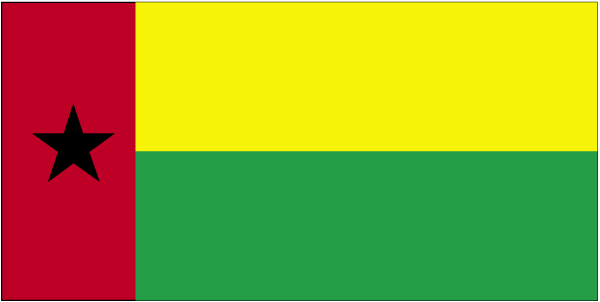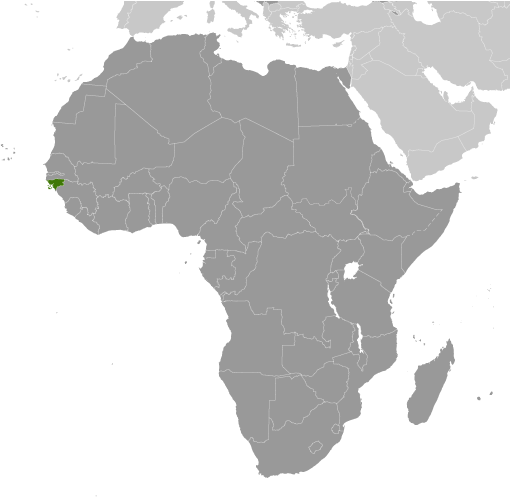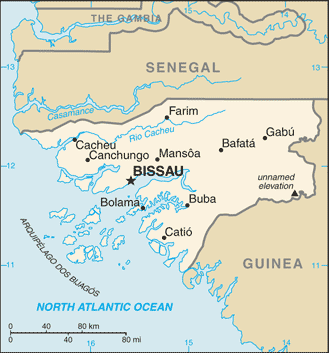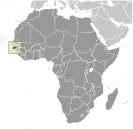
|
|
Advertisements:
EconomyEconomy - overview
One of the poorest countries in the world, Guinea-Bissau's legal economy depends mainly on farming and fishing, but trafficking in narcotics is probably the most lucrative trade. The combination of limited economic prospects, a weak and faction-ridden government, and favorable geography have made this West African country a way station for drugs bound for Europe. Cashew crops have increased remarkably in recent years; low rainfall hindered cereals and other crops in 2011. Guinea-Bissau exports fish and seafood along with small amounts of peanuts, palm kernels, and timber. Rice is the major crop and staple food. However, intermittent fighting between Senegalese-backed government troops and a military junta destroyed much of the country's infrastructure and caused widespread damage to the economy in 1998; the civil war led to a 28% drop in GDP that year, with partial recovery in 1999-2002. In December 2003, the World Bank, IMF, and UNDP were forced to step in to provide emergency budgetary support in the amount of $107 million for 2004, representing over 80% of the total national budget. The government is successfully implementing a three-year $33 million extended credit arrangement with the IMF that runs through 2012. In December 2010 the World Bank and IMF announced support for $1.2 billion worth of debt relief. Guinea-Bissau made progress with debt relief in 2011 when members of the Paris Club opted to write-off much of the country's obligations. Gdp (purchasing power parity) World Ranking: 190
$1.95 billion (2011 est.)
$1.852 billion (2010 est.) $1.789 billion (2009 est.) Note Data are in 2011 US dollars Gdp (official exchange rate)
$969 million (2011 est.)
Gdp - real growth rate World Ranking: 60
5.3% (2011 est.)
3.5% (2010 est.) 3% (2009 est.) Gdp - per capita (ppp) World Ranking: 208
$1,200 (2011 est.)
$1,100 (2010 est.) $1,100 (2009 est.) Note Data are in 2011 US dollars Gdp - composition by sector
Agriculture 55.8%
Industry 13% Services 31.2% (2011 est.) Labor force World Ranking: 155
632,700 (2007)
Labor force - by occupation
Agriculture 82%
Industry and services 18% (2000 est.) Unemployment rate
NA%
Population below poverty line
NA%
Household income or consumption by percentage share
Lowest 10% 2.9%
Highest 10% 28% (2002) Budget
Revenues $183.5 million
Expenditures $202.8 million (2011 est.) Taxes and other revenues World Ranking: 173
18.9% of GDP (2011 est.)
Budget surplus (+) or deficit (-) World Ranking: 76
-2% of GDP (2011 est.)
Inflation rate (consumer prices) World Ranking: 122
5% (2011 est.)
2.5% (2010 est.) Central bank discount rate World Ranking: 75
4.25% (31 December 2009)
4.75% (31 December 2008) Commercial bank prime lending rate World Ranking: 41
15.3% (31 December 2011 est.)
15% (31 December 2010 est.) Stock of narrow money World Ranking: 174
$308.7 million (31 December 2011 est.) $213.6 million (31 December 2010 est.) Stock of broad money World Ranking: 182
$364.5 million (31 December 2011 est.) $241.4 million (31 December 2010 est.) Stock of domestic credit World Ranking: 186
$115.9 million (31 December 2011 est.) $95.33 million (31 December 2010 est.) Market value of publicly traded shares
$NA
Agriculture - products
Rice, corn, beans, cassava (manioc), cashew nuts, peanuts, palm kernels, cotton; timber; fish Industries
Agricultural products processing, beer, soft drinks Industrial production growth rate World Ranking: 72
4.7% (2003 est.)
Electricity - production World Ranking: 197
70 million kWh (2008 est.)
Electricity - consumption World Ranking: 199
65.1 million kWh (2008 est.)
Electricity - exports
0 kWh (2009 est.)
Electricity - imports
0 kWh (2009 est.)
Oil - production World Ranking: 179
0 bbl/day (2010 est.)
Oil - consumption World Ranking: 179
3,000 bbl/day (2010 est.)
Oil - exports World Ranking: 161
0 bbl/day (2009 est.)
Oil - imports World Ranking: 173
2,565 bbl/day (2009 est.)
Oil - proved reserves World Ranking: 139
0 bbl (1 January 2011 est.)
Natural gas - production World Ranking: 190
0 cu m (2009 est.)
Natural gas - consumption World Ranking: 185
0 cu m (2009 est.)
Natural gas - exports World Ranking: 110
0 cu m (2009 est.)
Natural gas - imports World Ranking: 201
0 cu m (2009 est.)
Natural gas - proved reserves World Ranking: 184
0 cu m (1 January 2011 est.)
Current account balance World Ranking: 69
-$60.5 million (2011 est.)
-$89.6 million (2010 est.) Exports World Ranking: 181
$244.6 million (2011 est.)
$126 million (2010 est.) Exports - commodities
Fish, shrimp; cashew nuts, peanuts, palm kernels, sawn lumber Exports - partners
India 41.5%, Nigeria 33.9%, Brazil 8.7%, Togo 7.9% (2011) Imports World Ranking: 194
$327.6 million (2011 est.)
$206.1 million (2010 est.) Imports - commodities
Foodstuffs, machinery and transport equipment, petroleum products Imports - partners
Portugal 28.3%, Senegal 15.6%, China 4.7% (2011) Debt - external World Ranking: 151
$1.095 billion (31 December 2010 est.) $941.5 million (31 December 2000 est.) Exchange rates
Communaute Financiere Africaine francs (XOF) per US dollar - 471.87 (2011 est.)495.28 (2010 est.) 472.19 (2009) 447.81 (2008) 493.51 (2007) Fiscal year
Calendar year
Comments
Add a new comment: |
Advertisement
Members area
Guinea - Bissau (Bissau):
 
GPS points from Guinea - Bissau (Bissau)
|
||||||||

 Since independence from Portugal in 1974, Guinea-Bissau has experienced considerable political and military upheaval. In 1980, a military coup established authoritarian dictator Joao Bernardo 'Nino' VIEIRA as president. Despite setting a path to a market economy and multiparty system, VIEIRA's regime was characterized by the suppression of political opposition and the purging of political rivals. Several coup attempts through the 1980s and early 1990s failed to unseat him. In 1994 VIEIRA was elected president in the country's first free elections. A military mutiny and resulting civil war in 1998 eventually led to VIEIRA's ouster in May 1999. In February 2000, a transitional government turned over power to opposition leader Kumba YALA after he was elected president in transparent polling. In September 2003, after only three years in office, YALA was ousted by the military in a bloodless coup, and businessman Henrique ROSA was sworn in as interim president. In 2005, former President VIEIRA was re-elected president pledging to pursue economic development and national reconciliation; he was assassinated in March 2009. Malam Bacai SANHA was elected in an emergency election held in June 2009, but he passed away abruptly in January 2012. A military coup on 12 April 2012 prevented Guinea-Bissau's second-round presidential election - to determine SANHA's successor - from taking place.
Since independence from Portugal in 1974, Guinea-Bissau has experienced considerable political and military upheaval. In 1980, a military coup established authoritarian dictator Joao Bernardo 'Nino' VIEIRA as president. Despite setting a path to a market economy and multiparty system, VIEIRA's regime was characterized by the suppression of political opposition and the purging of political rivals. Several coup attempts through the 1980s and early 1990s failed to unseat him. In 1994 VIEIRA was elected president in the country's first free elections. A military mutiny and resulting civil war in 1998 eventually led to VIEIRA's ouster in May 1999. In February 2000, a transitional government turned over power to opposition leader Kumba YALA after he was elected president in transparent polling. In September 2003, after only three years in office, YALA was ousted by the military in a bloodless coup, and businessman Henrique ROSA was sworn in as interim president. In 2005, former President VIEIRA was re-elected president pledging to pursue economic development and national reconciliation; he was assassinated in March 2009. Malam Bacai SANHA was elected in an emergency election held in June 2009, but he passed away abruptly in January 2012. A military coup on 12 April 2012 prevented Guinea-Bissau's second-round presidential election - to determine SANHA's successor - from taking place.